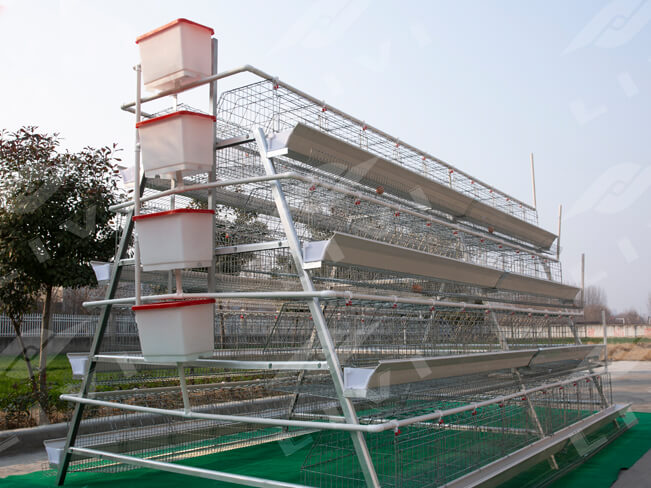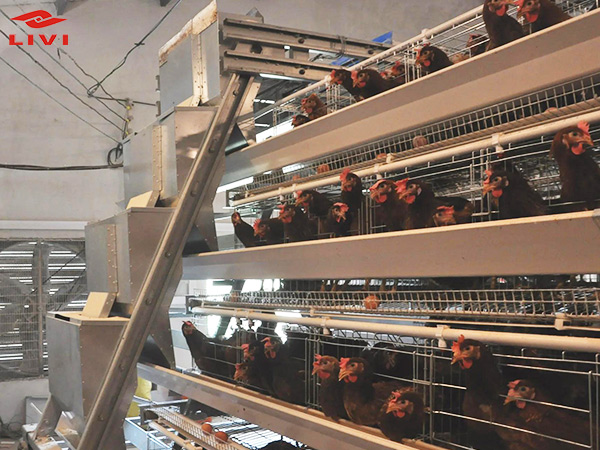Environmental benefits of battery chicken cages in Burkina Faso
Burkina Faso is a country located in West Africa, and agriculture is an important part of the country's economy. In recent years, farmers in the country have begun to use s battery chicken cages in Burkina Faso to raise poultry. This breeding method not only has a positive impact on farmers' income, but also has certain environmental benefits.
First of all, battery chicken cages in Burkina Faso can save land resources. Burkina Faso’s land resources are limited, and the traditional chicken coop farming method requires a large amount of land. The stacked chicken cages can stack the chicken houses vertically, which greatly reduces the floor space, saves land resources, and helps protect farmland and the natural environment.

Secondly, battery chicken cages in Burkina Faso help reduce pollutant emissions. In traditional chicken house farming methods, poultry feces and urine are concentrated together, which easily produces odor and pollution. The stacked chicken cage adopts a modular design, and each module has an independent feces discharge board, which can effectively separate feces and urine, reduce the generation and discharge of pollutants, and play a certain role in environmental protection.
Finally, battery chicken cages in Burkina Faso help reduce the spread of infectious diseases. In the traditional chicken house breeding method, poultry are prone to contact with each other, and the risk of spreading infectious diseases is high. The stacked chicken cages can raise poultry in layers, reducing the contact between them and reducing the incidence of infectious diseases. This is of great significance for protecting the environment and human health.
To sum up, Burkina Faso poultry cage farming method has environmental benefits of saving land resources, reducing pollutant emissions and reducing the spread of infectious diseases. This farming method helps protect farmland and the natural environment and improves the sustainable development of agriculture.
Advantages and development trends of poultry farming cages
As an important part of the modern poultry breeding industry, poultry farming cages play an important role in improving production efficiency, ensuring poultry health and providing high-quality poultry products. With the development of science and technology, poultry farming cagesare constantly innovating and improving to achieve higher breeding efficiency and poultry welfare. In the following article, we will discuss the advantages of poultry cages and their future development trends.
First, poultry farming cages can improve production efficiency. Compared with the traditional free-range breeding model, cage raising can better manage and control the living environment of poultry. Through reasonable design and large-scale management, cages can make poultry groups closer and more orderly, providing a highly hygienic and low-pollution breeding environment. This not only effectively prevents the spread of disease, but also reduces losses and mortality. In addition, the cage method can also reduce the waste of food and water and improve the feed conversion rate of poultry, thereby saving resources and costs.

Secondly, poultry farming cages can better protect the health of the birds. Proper cage care can provide a comfortable living environment and maintain appropriate temperature, humidity and ventilation conditions. This helps reduce the occurrence of parasites and diseases and improves the immunity and disease resistance of the birds. In addition, cage raising can also effectively reduce the interference of poultry by external environmental factors, such as weather changes and external noise. These controls help reduce stress and anxiety and improve bird growth and meat quality.
However, poultry farming cages also face some challenges and controversies. Some people believe that cage raising will restrict the free movement of poultry and cause welfare problems for the birds. In response to these problems, the industry is actively seeking innovation and improvement. For example, designing more spacious cages and providing more free space to reduce stress and discomfort for birds. In addition, optimizing the material and structure of breeding cages to improve comfort and the quality of life of birds is also an important direction.
Looking to the future, the development trend of poultry farming cages will pay more attention to technology and environmental protection. As artificial intelligence and IoT technologies continue to develop, we can expect more advanced sensor systems and intelligent control technologies to be applied in poultry cages. This will enable the breeding cages to better monitor the behavior, health status and environmental data of the birds, and provide timely personalized breeding plans and management suggestions. In addition, it is also expected to use more environmentally friendly materials and energy to reduce waste emissions and energy consumption to achieve the goal of sustainable development.
In summary, poultry farming cages, as a modern breeding method, have the advantages of improving production efficiency and ensuring the health of poultry. In the future, cage farming will pay more attention to bird welfare and environmental protection, and achieve a higher level of breeding management through technological innovation. Through continuous improvement and innovation, we are confident of achieving more outstanding results in the field of poultry farming.
The future of layer chicken cages in Ghana
Ghana chicken farming industry is moving in a more modern and sustainable direction, with layer chicken cages in Ghana being seen as a key factor in increasing production efficiency and improving chicken raising conditions.
On the one hand, layer chicken cages in Ghana have been a huge success in poultry farming in Ghana. They provide more production space, reducing the need for chicken housing and allowing farmers to manage their chickens more efficiently. This not only increases chicken and egg production, but also helps increase farmers’ income.

On the other hand, layer chicken cages in Ghana improve sanitation and waste management. They make manure and waste easier to dispose of, reducing negative impact on the environment. This helps reduce pollution, protect ecosystems, and make chicken farming more sustainable.
However, there are some challenges that need to be overcome to realize the full potential of layer chicken cages in Ghana. First, investment costs may pose a barrier to some small farmers, thus requiring support from government and agricultural institutions. Secondly, training is key to ensure farmers understand how to use the equipment effectively.
Ghanaian farmers benefit from sustainable poultry farming with battery chicken cages
Ghanaian farmers benefit from sustainable poultry farming with battery chicken cages
Ghana's poultry farming industry is undergoing a revolutionary change, driven by modern poultry farming equipment, the most eye-catching of which is the stacked chicken cage. The rise of this technology is already delivering impressive results, which bodes well for farmers and breeders in Ghana for sustainable development.
In traditional poultry farming, the problem of land occupation has always been a headache. However, Ghana has limited land resources and faces pressures from urbanization and competition for agricultural land. This has forced farmers to find more efficient farming methods to meet growing demand.
The advent of battery chicken cages in Ghana has changed the rules of the game. The core of this equipment are multi-layer vertical battery chicken cages that can be flexibly stacked together to maximize land utilization. Compared with traditional cage raising methods, battery chicken cages allow farms to significantly increase egg production and occupy less land.

But that's not the only benefit. battery chicken cages are often equipped with automated feed and water systems to ensure that the chickens receive adequate food and water. This kind of automation helps reduce feed waste, improve resource usage efficiency, and reduce breeding costs. At the same time, the sanitary conditions of these chicken cages are easier to manage, reducing sanitary problems that may occur under traditional breeding methods.
Moreover, the design of battery chicken cages in Ghana helps separate eggs and feces, reducing the risk of egg contamination. This means that the eggs produced are cleaner, safer and more in line with high-quality standards, further improving market competitiveness.
In Ghana, more and more farmers are beginning to realize the potential of stacked chicken cages and actively investing in this modern farming method. As demand for high-quality eggs continues to increase, this sustainable farming method provides farmers with the opportunity to achieve profitability. Additionally, it contributes to the sustainability of the agricultural sector, reducing resource waste and environmental pollution.
Overall, battery chicken cages in Ghana represent the future of poultry farming in Ghana. This technology has been successfully used on many farms, improving yields and benefits and reducing environmental burdens. As more farmers adopt this technology, Ghana's poultry farming industry will move in a more sustainable and prosperous direction, while providing more high-quality eggs to the market.